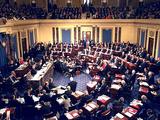The Supercommittee’s Failure Poses an Economic Threat
Post Views 0The implosion from the congressional supercommittee is likely to delay any major deficit-reduction agreement until sometime after the next presidential election and may pose an immediate threat to the struggling U.S. economy.
The committee’s failure to reach a deal means several of the tax programs, as well as a payroll tax holiday, risk expiring at the beginning of next year, weighing on the household spending that accounts for about 70 percent of the world’s largest economy. The panel’s inability to agree on the $1.2 trillion budget cuts stocked doubts about the U.S. lawmakers’ ability to overcome partisan gridlock and deal with the nation’s fiscal future.
”They could not agree even on the smaller challenge of $1.2 trillion,” said the former While House budget direction Alice Rivlin, among a coalition of officials who pushed the panel to ”go big”’ and to find $4 trillion in savings, in an e-mail. ”I do not see a way to get the big deal before the election, if then. It is really discouraging!”
Yet, Standard & Poor’s reaffirmed that it would keep the U.S. credit rating at AA+ after stripping the government of its top AAA grade on August 5. Moody’s Investors Service reaffirmed its AAA ratting with a poor outlook. In a statement Fitch Ratings noted that is said August that a supercommittee failure would probably result in a ”negative rating action,” likely a revision of its outlook to negative, and that a review would be concluded by the end of this month.
Investors largely shrugged off S&P’S August downfall of U.S. debt. After the move, the government’s borrowing costs fell to record lows as the Treasury was rallying.
Yesterday, S&P said that its rating would stand because the committee’s failure triggers $1.2 trillion in automatic spending cuts, which were put in place in the even that no compromise could be reached. S&P said in a statement that easing those automatic spending limits may cause a ”downward pressure on the ratings.”
Even that so-called trigger may be in jeopardy, with both the Democrats and the Republicans very leery of the steep cutbacks at the Pentagon that Defense Secretary Leon Panetta has been called ”Draconian,” Congress has succeeded before in undoing debt-reduction enforcement mechanisms.
Republican Senators Lindsey Graham of South Carolina and John McCain of Arizona are already looking for other cuts to take the place of those the Pentagon faces. Representative Howard McKeon of California said that he would introduce legislation to prevent the spending reductions to defense.
”They have to really be careful not to mess with that,” said Robert Bixby, who is the head of the nonpartisan Concord Coalition, which presses for debt reduction. ”To dismantle it would be totally unacceptable.”
Other lawmakers say that they still seek a more-ambitious effort to curb record-high deficits, but their ideas already face opposition from top leaders in both parties.
The Supercommittee's Failure Poses an Economic Threat by Harrison Barnes



 Chicago’s Top Tech Companies
Chicago’s Top Tech Companies  10 Jobs with the Fastest Growing Salary in 2017
10 Jobs with the Fastest Growing Salary in 2017  Atlanta’s Top Telecom, Cell Phone, and Electronics Manufacturers
Atlanta’s Top Telecom, Cell Phone, and Electronics Manufacturers  Amazon May Have a Better Grasp on Workplace Culture
Amazon May Have a Better Grasp on Workplace Culture  The Economy Under a Trump Presidency
The Economy Under a Trump Presidency